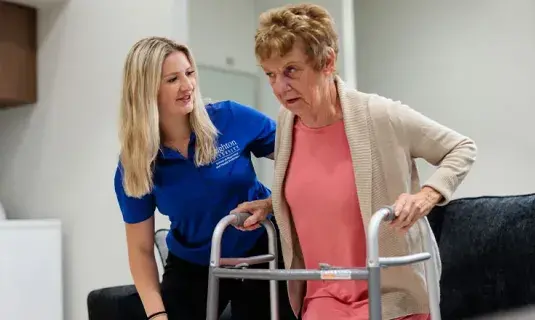
Department of Occupational Therapy
Dedicated to Elevating Occupational Therapy and Compassionate Care
Occupational therapy (OT) isn’t just a profession; it’s a lifeline for those facing physical, emotional or developmental challenges. At Creighton, we’re dedicated to advancing the field and equipping our students with the knowledge, skills and compassion needed to make a meaningful impact in the lives of others. Through innovative education offered in Omaha, Phoenix, Denver and Anchorage, we prepare students to be empathetic and effective OT practitioners who make a difference. Learn more about Creighton's Occupational Therapy Department below.
Earn a bachelor’s degree alongside your professional health program.
Through an innovative collaboration between the School of Pharmacy and Health Professions and the College of Arts and Sciences, students can earn a Bachelor of Science with a major in Interdisciplinary Health Studies while pursuing a doctorate in:
- Occupational Therapy (OTD)
- Pharmacy (PharmD)
- Physical Therapy (DPT)
Accelerate your healthcare journey at Creighton University while earning the skills and credentials to prepare yourself for whatever the future brings.

OT program in the nation, per U.S. News & World Report

Faculty members recognized as AOTA fellows

Average pass rate on the national occupational therapy exam over the past 5 years
Leading in OT Research
Together, faculty, students and fellows pursue innovative, rigorous and impactful research focused on health outcomes; social justice and health equity; and scholarship of teaching and learning. We aim to find solutions to enhance human participation, health and quality of life. Our inclusive culture of research provides robust opportunities for inquiry and collaboration.

Interested in becoming a fieldwork educator?
Practicing OTs are an important part of the educational process. Our students gain hands-on experience by working with fieldwork educators as part of our curriculum. Practitioners across the nation and around the globe offer a rich variety of clinical experiences for our students, and we’re always looking to create new partnerships. Email us for more information about becoming a fieldwork educator.
The Accreditation Council for Occupational Therapy Education (ACOTE) educational standard, A.2.6, states that, “The program must document policies and procedures to ensure that the program director and faculty are aware of and abide by the current code of ethics of the profession of occupational therapy.” In accordance with this standard, this policy governs only those instances where allegations of violations of the Occupational Therapy Code of Ethics are brought forth.
Policy
The faculty within the Department of Occupational Therapy is committed to maintaining the educational programs and professional behaviors that meet or exceed accreditation standards. Each year, faculty members in the Occupational Therapy Department are asked to review the Code of Ethics and sign a statement explicating that they are aware of and will abide by the Code. The Occupational Therapy Program is committed to helping individuals correct any behavior that may be in contradiction to the Occupational Therapy Code of Ethics. Faculty members or other stakeholders are encouraged to voice and discuss concerns they have about a violation of the Occupational Therapy Code of Ethics. In cases where a formal complaint is deemed necessary, established procedures will be followed.
How to File an Ethics Complaint
For further information about the code of ethics, please contact:
Keli Mu, PhD, OTR/L
Professor and Chair of Department of Occupational Therapy
Email: kelimu@creighton.edu
Phone: 402.280.5938
Fax: 402.280.5692








